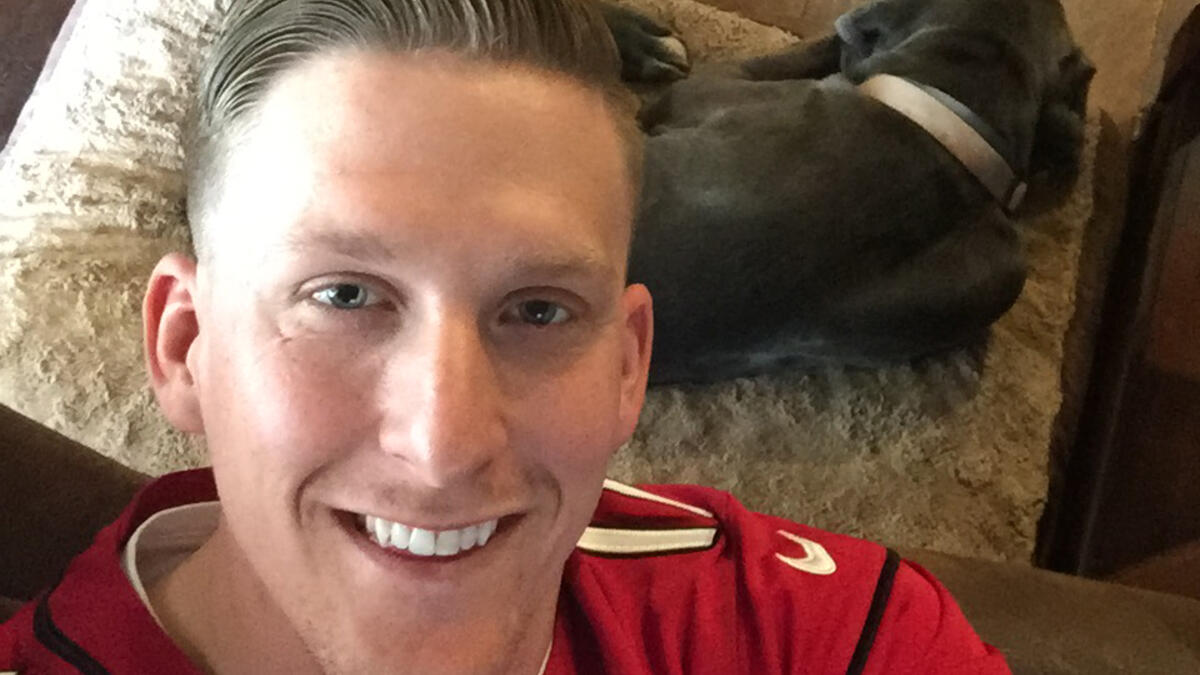Editor's note: This story is part of a series of profiles of notable spring 2021 graduates.
Brandon Myer nearly dropped out of school in sixth grade and settled for a D-average his sophomore year of high school. You’d never guess it if you met him today. He’s now a high-performing ASU student completing his bachelor’s degree in kinesiology this spring with plans to complete a master’s degree in 2022.
With love, five years of military service and ASU, Brandon turned his life around.
“I did not really care about life growing up, and I always thought very little of myself,” Myer said. “This probably came from my father leaving when I was a kid and growing up without much money. The only reason I graduated from high school was because my ex-wife — girlfriend at the time — made me want to be better.”
After high school, Myer worked at a local movie theater but soon realized his life wasn’t going in the direction he desired, so he joined the Navy, where he served for five years, including one deployment to Afghanistan. While in the military, he started his college education in California and earned two associate degrees — one in medical studies and another liberal arts degree in math and science. This gave him the confidence to pursue his bachelor’s degree at ASU, and though he struggled with school in his youth, Myer said he developed a support system that empowered him to thrive on campus. “Everyone was in my corner and wanted me to succeed,” he said.
Myer now encourages others, working as a teaching assistant in ASU’s College of Health Solutions and volunteering his time with events that benefit people with special needs, particularly those with Down syndrome. “I took a class on special populations, including people with Down syndrome, cerebral palsy, Tourette syndrome and other conditions. I took the class because I wanted to learn about why these syndromes happen and what I can do to help people with these conditions live a better life.”
To that end, Myer has been working in a research lab and helping organizations like Sharing Down Syndrome put on educational events. “I cannot wait until these events start happening again so we can continue to raise awareness about Down syndrome.”
Read on to learn more about Myer and his educational journey.
Question: Why did you choose ASU?
Answer: I wanted to go to ASU when I was child. My mom used to drive by the Tempe campus, and I knew this is where I wanted to go. When I got out of the Navy, the only college that I applied to was ASU because this was my only choice.
Q: What was the “aha” moment when you realized you wanted to study kinesiology?
A: A friend told me that I should look into kinesiology because I enjoyed knowing how things worked in fitness. The more he talked about it, the more excited I got. I looked up ASU and realized they had a program, so it was perfect. Knowing that I could combine both my passion for fitness and my desire to get a good education was my “aha” moment.
Q: What’s something you learned while at ASU — in the classroom or otherwise — that surprised you or changed your perspective?
A: I didn’t realize how much was able to be done for the Down syndrome population. I knew that this population was very capable, but I did not realize how much more they can accomplish through therapies like assisted cycling. In class, my professor Shannon Ringenbach taught us about why and how Down syndrome occurs. That’s important, but the most important thing that someone can teach is how to help those who sometimes cannot help themselves.
Q: What are your plans after graduation?
A: Right now, I am in a 4+1 program to get my master’s degree in clinical exercise physiology. I will finish that next spring, and then I hope to go to medical school. I am studying for the MCAT, which I will take in August or September.
Q: What’s the best piece of advice you’d give to those still in school?
A: Do not give up even though it might seem hard. There is nothing wrong with asking for a little help. Asking for help is something I struggle with because I want to do everything on my own, but that’s not how life works. We all rely on each other for something.
More Health and medicine

ASU offers bilingual counseling to Spanish speakers
Arizona is one of the five states in the nation with the highest percentage of Hispanic residents, according to the U.S.…

College of Health Solutions launches first-of-its-kind diagnostics industry partnership to train the workforce of tomorrow
From 2007 to 2022, cytotechnology certification examinees diminished from 246 to 109 per year. With only 19 programs in the…

ASU's Roybal Center aims to give older adults experiencing cognitive decline more independence
For older people living alone and suffering from cognitive decline, life can be an unsettling and sometimes scary experience.…


